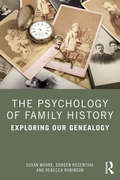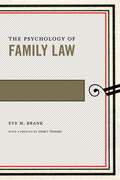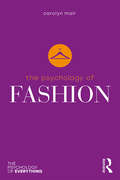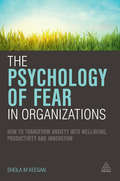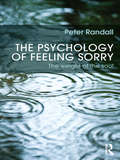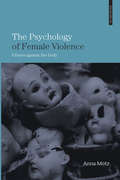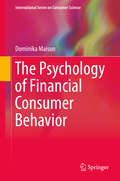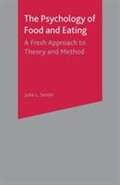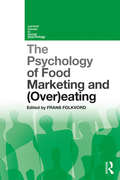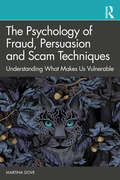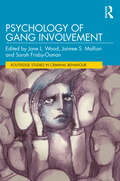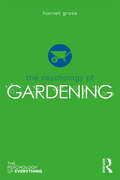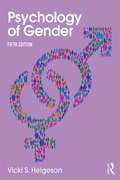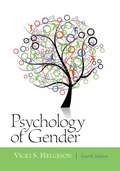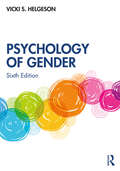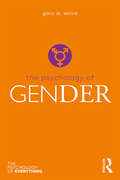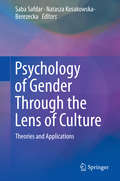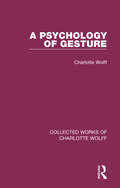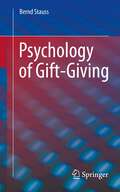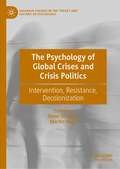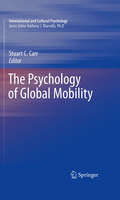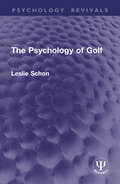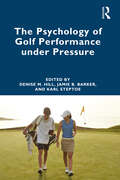- Table View
- List View
The Psychology of Family History: Exploring Our Genealogy
by Susan Moore Doreen Rosenthal Rebecca RobinsonThis important book examines the motives that drive family historians and explores whether those who research their ancestral pedigrees have distinct personalities, demographics or family characteristics. It describes genealogists’ experiences as they chart their family trees including their insights, dilemmas and the fascinating, sometimes disturbing and often surprising, outcomes of their searches. Drawing on theory and research from psychology and other humanities disciplines, as well as from the authors’ extensive survey data collected from over 800 amateur genealogists, the authors present the experiences of family historians, including personal insights, relationship changes, mental health benefits and ethical dilemmas. The book emphasises the motivation behind this exploration, including the need to acknowledge and tell ancestral stories, the spiritual and health-related aspects of genealogical research, the addictiveness of the detective work, the lifelong learning opportunities and the passionate desire to find lost relatives. With its focus on the role of family history in shaping personal identity and contemporary culture, this is fascinating reading for anyone studying genealogy and family history, professional genealogists and those researching their own history.
The Psychology of Family Law (Psychology and the Law #4)
by Eve M. Brank Linda J. DemaineBridges family law and current psychological research to shape understanding of legal doctrine and policy Family law encompasses legislation related to domestic relationships—marriages, parenthood, civil unions, guardianship, and more. No other area of law touches so closely to home, or is changing at such a rapid pace—in fact, family law is so dynamic precisely because it is inextricably intertwined with psychological issues such as human behavior, attitudes, and social norms. However, although psychology and family law may seem a natural partnership, both fields have much to learn from each other. Our laws often fail to take into account our empirical knowledge of psychology, falling back instead on faulty assumptions about human behavior. This book encourages our use of psychological research and methods to inform understandings of family law. It considers issues including child custody, intimate partner violence, marriage and divorce, and child and elder maltreatment. For each topic discussed, Eve Brank presents a case, statute, or legal principle that highlights the psychological issues involved, illuminating how psychological research either supports or opposes the legal principles in question, and placing particular emphasis on the areas that are still in need of further research. The volume identifies areas where psychology practice and research already have been or could be useful in molding legal doctrine and policy, and by providing psychology researchers with new ideas for legally relevant research.
The Psychology of Fashion (The Psychology of Everything)
by Carolyn MairWhat do our clothes say about us? How do the clothes we wear affect our moods and emotions? How does the fashion industry encourage us to aspire to look in a certain way? The Psychology of Fashion offers an insightful introduction to the exciting and dynamic world of fashion in relation to human behaviour, from how clothing can affect our cognitive processes to the way retail environments manipulate consumer behaviour. The book explores how fashion design can impact healthy body image, how psychology can inform a more sustainable perspective on the production and disposal of clothing, and why we develop certain shopping behaviours. With fashion imagery ever present in the streets, press and media, The Psychology of Fashion shows how fashion and psychology can make a positive difference to our lives.
Psychology of Fear, Crime and the Media: International Perspectives (Researching Social Psychology)
by Derek ChadeeThe media continue to have a significant persuasive influence on the public perception of crime, even when the information presented is not reflective of the crime rate or actual crime itself. There have been numerous theoretical studies on fear of crime in the media, but few have considered this from a social psychological perspective. As new media outlets emerge and public dependence on them increases, the need for such awareness has never been greater. This volume lays the foundation for understanding fear of crime from a social psychological perspective in a way that has not yet been systematically presented to the academic world. This volume brings together an international team of experts and scholars to assess the role of fear and the media in everyday life. Chapters take a multidisciplinary approach to psychology, sociology and criminology and explore such topics as dual process theory, construal level theory, public fascination with gangs, and other contemporary issues.
The Psychology of Fear in Organizations
by Sheila KeeganIn the context of global economic recession, fear has become institutionalized in many organizations, both in the private and public sectors. Board directors are under pressure from shareholders, senior executives are attempting to maintain sales in a nervous market and many people are concerned about job security and maintaining their living standards. This book shows how fear manifests itself in large organizations, how it impacts on the workforce and how by reducing our willingness to take risks and to innovate, it can inhibit economic growth and innovation, at both an individual and corporate level. The Psychology of Fear in Organizations examines the psychological barriers to innovation and presents initiatives to loosen the paralysis caused by the economic downturn.
The Psychology of Feeling Sorry: The Weight of the Soul
by Peter RandallCan feeling genuinely sorry enable an important healing experience? Can relieving the weight of guilt restore a general sense of self-worth? Can an individual's dawning awareness give birth to feelings of remorse; perhaps even to acts of repentance? The concepts of betrayal, vengeance and forgiveness have long been a major part of religious doctrine throughout the world. However, only in recent times has the impact of these emotions become of interest to those involved in psychological study. In The Psychology of Feeling Sorry, Peter Randall links contemporary psychological research with religious teachings and doctrine that have provided spiritual guidance for hundreds of years. Illustrated with explanatory narratives, Randall fuses religious precepts with psychological theory concerning one of the least understood but most common of human emotions; feeling bad about one's 'sins'. Using an eclectic approach Randall explores how much of what is believed within the domain of faith is now supported by modern psychological research. This book will be of interest not only to those with religious beliefs, but to psychologists, psychotherapists, students, and anyone with an interest in the intersection of psychology, psychotherapy, and theology.
The Psychology of Female Violence: Crimes Against the Body
by Anna MotzFirst Published in 2000. Routledge is an imprint of Taylor & Francis, an informa company.
The Psychology of Financial Consumer Behavior (International Series on Consumer Science)
by Dominika MaisonThis book stresses the psychological perspective in explaining financial behavior. Traditionally, financial behaviors such as saving, spending, and investing have been explained using demographic and economic factors such as income and product pricing. The consequence of this way of thinking is that financial institutions view their clients mostly from the perspective of their income. By taking a psychological approach, this book stresses the perspective of consumers confronted with a quickly changing financial world: the changing of financial offers and products (savings, investments, loans), the changing of payment methods (from cash to cheques, cards and mobile payments), the accessibility and temptation of goods, and the changing of insurance and pension systems.The Psychology of Financial Consumer Behavior provides insight into the thought processes of consumers in a variety of financial topics. Coverage includes perceptions of wealth, the pleasure or pain of spending, cashless transactions, saving and investing, loans, planning for the future, taxes, and financial education. The book holds appeal for researchers, professionals, and students in economics, psychology, economic psychology, marketing and consumer science, or anyone interested in financial behaviors.
The Psychology of Food and Eating: A Fresh Approach to Theory and Method
by John L. SmithThere has long been an interest in food among psychologists across the full range of the discipline, from the physiology of hunger and the psychophysics of taste and smell to the development of food preferences and the social psychology of food-related behaviour and attitudes. In this new text, John L. Smith takes a much-needed broad view of the field, bringing together physiological research, psychodynamic theory, and sociological perspectives in a way that both celebrates their differences and explores their potential fusion. The Psychology of Food and Eating provides more than a 'dry' decontextualised physiological explanation of food and eating. It moves on to enable students to see food in its wider context in terms of everyday life and real routines. It provides an overview of social scientific approaches to the study of food (biosocial, socioanthropological, structural, feminist/psychodynamic) and an appreciation of the various ways that social psychological perspectives can be applied to real-life contexts. With its detailed (and almost confessional) account of the research process, students will gain an insider's perspective on how observational and idiographic techniques are deployed in practice in everyday settings. The book will prove of interest not only to students and researchers on health psychology, applied psychology and critical psychology courses, but also to all those looking for a really accessible introduction to contemporary alternatives to the more conventional research techniques used in this field.
The Psychology of Food Marketing and Overeating
Integrating recent research and existing knowledge on food marketing and its effects on the eating behaviour of children, adolescents, and adults, this timely collection explores how food promotion techniques can be used to promote healthier foods. Numerous factors influence what, when, and how we eat, but one of the main drivers behind the unhealthy dietary intake of people is food marketing. Bringing together important trends from different areas of study, with state-of-the-art insights from multiple disciplines, the book examines the important factors and psychological processes that explain the effects of food marketing in a range of contexts, including social media platforms. The book also provides guidelines for future research by critically examining interventions and their effectiveness in reducing the impact of food marketing on dietary intake, in order to help develop new research programs, legislation, and techniques about what can be done about unhealthy food marketing. With research conducted by leading scholars from across the world, this is essential reading for students and academics in psychology and related areas, as well as professionals interested in food marketing and healthy eating.
The Psychology of Foreign Policy (Palgrave Studies in Political Psychology)
by Christer Pursiainen Tuomas ForsbergThis book focuses on foreign policy decision-making from the viewpoint of psychology. Psychology is always present in human decision-making, constituted by its structural determinants but also playing its own agency-level constitutive and causal roles, and therefore it should be taken into account in any analysis of foreign policy decisions. The book analyses a wide variety of prominent psychological approaches, such as bounded rationality, prospect theory, belief systems, cognitive biases, emotions, personality theories and trust to the study of foreign policy, identifying their achievements and added value as well as their limitations from a comparative perspective. Understanding how leaders in world politics act requires us to consider recent advances in neuroscience, psychology and behavioral economics. As a whole, the book aims at better integrating various psychological theories into the study of international relations and foreign policy analysis, as partial explanations themselves but also as facets of more comprehensive theories. It also discusses practical lessons that the psychological approaches offer since ignoring psychology can be costly: decision-makers need to be able reflect on their own decision-making process as well as the perspectives of the others. Paying attention to the psychological factors in international relations is necessary for better understanding the microfoundations upon which such agency is based.
The Psychology of Fraud, Persuasion and Scam Techniques: Understanding What Makes Us Vulnerable
by Martina DoveThe Psychology of Fraud, Persuasion and Scam Techniques provides an in-depth explanation of not only why we fall for scams and how fraudsters use technology and other techniques to manipulate others, but also why fraud prevention advice is not always effective. Starting with how fraud victimisation is perceived by society and why fraud is underreported, the book explores the different types of fraud and the human and demographic factors that make us vulnerable. It explains how fraud has become increasingly sophisticated and how fraudsters use communication, deception and theories of rationality, cognition and judgmental heuristics, as well as specific persuasion and scam techniques, to encourage compliance. Covering frauds including romance scams and phishing attacks such as advance fee frauds and so-called miracle cures, the book explores ways we can learn to spot scams and persuasive communication, with checklists and advice for reflection and protection. Featuring a set of practical guidelines to reduce fraud vulnerability, advice on how to effectively report fraud and educative case studies and examples, this easy-to-read, instructive book is essential reading for fraud prevention specialists, fraud victims and academics and students interested in the psychology of fraud.
Psychology of Gang Involvement (Routledge Studies in Criminal Behaviour)
by Jane L. Wood Jaimee S. Mallion Sarah Frisby-OsmanPsychology of Gang Involvement expands existing knowledge by applying psychological knowledge to gangs, including how gang members think, their mental and emotional well-being, and their perceptions of gang involvement, as well as issues relating to gang prevention and intervention strategies. This book offers readers a clearer understanding of the important role that social psychological processes play in the formation and maintenance of gangs and gang membership. It will enhance readers’ understanding of gang members’ social cognition, emotional intelligence, well-being, and mental health, as well as how these factors potentially promote and sustain individual gang involvement. Readers will discover also how these important psychological characteristics vary according to an individual’s commitment to a gang. Organized in three sections, the first focuses on issues relevant to theoretical perspectives of gang involvement. Chapters include detailed examinations of a gang member’s experiences and the implications of these for theoretical development, and considerations of the importance of social and psychological issues such as group processes and levels of commitment to gang membership to, understand and explain involvement in gangs. The second section centers on issues such as adverse childhood experiences and trauma, and examines their links to male and female gang membership as potential risk factors and outcomes of gang involvement. The section concludes by contemplating how the mental health, traumatic experiences, and involvement in violence compares between gang members and other violent men in adulthood. The final section considers current responses to gang membership by evaluating individual and group-based approaches to gang prevention and intervention strategies, and concludes with a theoretical conceptualization of how a strengths-based approach could work to reduce gang involvement. This book will be a useful text for a wide range of readers interested in, or working with gang members, including academics and students, practitioners, youth workers, clinicians, and criminal justice agents.
The Psychology of Gardening (The Psychology of Everything)
by Harriet GrossWhy do so many people love gardening? What does your garden say about you? What is guerrilla gardening? The Psychology of Gardening delves into the huge benefits that gardening can have on our health and emotional well-being, and how this could impact on the entire public health of a country. It also explores what our gardens can tell us about our personalities, how we can link gardening to mindfulness and restoration, and what motivates someone to become a professional gardener. With gardening being an ever popular pastime, The Psychology of Gardening provides a fascinating insight into our relationships with our gardens.
Psychology of Gender: Fifth Edition
by Vicki S. HelgesonNoted for its fair and equal coverage of men and women, this book reviews the research and issues surrounding gender from multiple perspectives including psychology, sociology, anthropology, and public health, with an emphasis on the interaction between biological and social theories. The implications of social roles, status, and gender-related traits on relationships and health that are central to students' daily lives are emphasized throughout. Students learn how to distinguish the similarities and differences between the sexes and the theories that explain the differences. Methodological flaws that may impact the observance of sex differences are also examined. Learning activities and pedagogical tools included in the text: Do Gender exercises which provide an opportunity to test hypotheses and explore data Sidebars on special interest topics and numerous visuals?that bring the studies to life Take Home Points that summarize key concepts in bulleted format Boldfaced key terms and definitions, chapter summaries, discussion questions, and suggested readings which help students review the material New to the 5th Edition: Expanded sections on cohabitation, homosexuality, online relationships, social media influences, single-sex classrooms, sex differences in math abilities, and gender implications of divorce on health Expanded coverage of gender and parenting, gender and the workplace, gender and power, and balancing work and family An expanded intersectional approach that highlights how gender is connected to social class, race, and ethnicity, including more coverage of gender system justification theory Coverage of transgender issues including recent changes in the DSM guidelines Streamlined discussions to further engage students to think about gender issues A companion website at www.routledge.com/cw/Helgeson where instructors will find Power Point slides, multiple choice quizzes, and short answer questions with suggested answers for each chapter; and students will find flashcards of key terms, chapter outlines, and links to related websites and further reading Divided into three parts, each section builds on the previous one. First, gender and the development of gender roles across cultures are introduced. Scientific methods used to study gender, attitudes toward gender, and the latest data and theories on sex differences in cognitive, social, and emotional domains are then introduced. Theories of gender-role development, including evolutionary, social learning, social role, and gender schema theories are reviewed along with the implications of gender on achievement. Part one reviews the key information on the similarities and differences between the sexes and the theories that explain the differences which lay the foundation for the remainder of the book. Part two examines the role of gender in relationships including communication styles and the impact of these interactions on friendship and romantic relationships. The third part examines the role of gender on physical and mental health. The effects of marriage and parenting on health are reviewed, including domestic abuse, along with how gender affects the association between work and health. This is an ideal text for upper level gender-focused courses including the psychology of gender, psychology of women or men, gender issues, and gender, women’s, or men’s studies taught in psychology, women’s studies, gender studies, sociology, and anthropology.
The Psychology of Gender: Fourth Edition
by Vicki S. HelgesonUnlike other gender texts, Psychology of Gender focuses equally on both men and women, drawing from empirical research and conceptual discussions.The book includes research and discussions surrounding gender in the areas of psychology, sociology, anthropology, medicine, and public health. It reviews the research from multiple perspectives, but emphasizes the implications of social roles, status, and gender-related traits, particularly for relationships and health–areas that are central to students' lives and that have a great impact on their day-to-day functioning. The text is designed for upper-level undergraduate/graduate-level gender-focused courses in a variety of departments.
Psychology of Gender
by Vicki S. HelgesonNoted for its fair and equal coverage of men and women, Psychology of Gender reviews the research and issues surrounding gender from multiple perspectives, including psychology, sociology, anthropology, and public health. Going far beyond discussions of biological sex and gender identity, the text explores the roles that society has assigned to females and males and the other variables that co-occur with sex, such as status and gender-related traits. The implications of social roles, status, and gender-related traits for relationships and health are also examined. The text begins with a discussion of the nature of gender and development of gender roles, before reviewing communication and interaction styles and how they impact our friendships and romantic relationships. It concludes with an exploration of how gender influences both physical and mental health. New to the 6th Edition: Emphasis on the intersectionality of gender, considering it as a part of wider social categories such as race, ethnicity, social class, and gender identity Recognition of the increasingly prevalent view that gender is nonbinary Extended coverage of LGBTQ individuals, their relationships, and their health Expanded discussions of key issues including gender-role strain, gender fluidity, women and STEM, parenthood, balancing family and work demands, online communication, and sexual harassment Accompanied by a comprehensive companion website featuring resources for students and instructors, alongside extensive student learning features throughout the book, Psychology of Gender is an essential read for all students of gender from psychology, women’s studies, gender studies, sociology, and anthropology.
The Psychology of Gender (The Psychology of Everything)
by Gary WoodWhat is the difference between sex and gender? What is the impact of gender-role stereotypes on our lives, our relationships and the world? What does gender mean to you? The Psychology of Gender looks at our biology, history and culture to consider the impact of gender roles and stereotypes, and addresses the 'dilemmas' we have regarding gender in a post-modern world. It offers a unique perspective on gender through storytelling and explores ideas around transgender and cisgender identities and androgyny, tackling hidden assumptions and helping us make sense of the world of gender. By examining the future of gender, The Psychology of Gender offers a platform for further exploration, and arrives at a new psychology of gender that emphasises relationships and helps us to understand our own gender identity and that of those around us.
Psychology of Gender Through the Lens of Culture
by Saba Safdar Natasza Kosakowska-BerezeckaThis unique collection brings a rarely-seen indigenous and global perspective to the study of gender and psychology. Within these chapters, researchers who live and work in the countries and cultures they study examine gender-based norms, values, expression, and relations across diverse Western and non-Western societies. Familiar as well as less-covered locations and topics are analyzed, including China, New Zealand, Israel, Turkey, Central America, the experience of refugees, and gendered health inequities across Africa such as in the treatment of persons with HIV. Included, too, are examples of culturally appropriate interventions to address disparities, and data on the extent to which these steps toward equality are working. Structurally, the volume is divided into three sections. The first two parts of the book take readers on a journey to different regions of the world to illustrate the most recent trends in research concerning gender issues, and then outline present implications and future prospects for the psychological analysis of both gender & culture. The third section of the book has an applied perspective and focuses on the cultural norms and values reinforcing gender equality as well as cultural and social barriers to them. A sampling of the topics covered: Sexual orientation across culture and time. A broader conceptualization of sexism in Poland. An analysis of gender roles within the family in Switzerland Modern-day dowries in South Asian international arranged marriages. The current state of gender equality in the United States of America. Socio-cultural determinants of gender disparity in Ghana. Psychology of Gender Through the Lens of Culture is a milestone toward core human rights and goals worldwide, and a critical resource for psychologists, sociologists, anthropologists, gender studies researchers, public policy makers and all those interested in promoting gender equality throughout the world.
A Psychology of Gesture (Collected Works of Charlotte Wolff #2)
by Charlotte WolffOriginally published in 1945, this title was a follow-up to the author’s previous book The Human Hand. This time she looks at the psychology of gesture and its relation to personality. The special place that a psychology of gesture merits is obvious. It permits a direct knowledge of personality without any effort or misleading co-operation on the part of the subject, since it can be applied without his being aware of the fact. The book ‘is constructed on a system of clinical studies and medico-psychological interpretations.’ The author felt that this title must be regarded as a complementary study to her main studies.
Psychology of Gift-Giving
by Bernd StaussGift-giving is an economically significant area of consumer behavior. For we are constantly buy gifts: for Christmas and Mother’s Day, for birth and baptism, for the start of school and exams, for engagements and weddings, for birthdays or as souvenirs. Moreover, gift-giving is a very important psychological phenomenon, based on voluntariness, but also representing a duty and requiring compliance with rules. Thus, gift giving is by no means always associated with joy, but also with stress in the search for a perfect gift and disappointment when gifts fail.The book presents central results of psychological research on gift-giving. These provide answers to the following questions, among others:What ‘secret’ rules of giving and receiving do we follow?What messages do we send with our gifts?How do certain characteristics - such as the amount of the price or empathy - influence satisfaction with a Gift-giving is an economically significant area of consumer behavior. For we are constantly buy gifts: for Christmas and Mother’s Day, for birth and baptism, for the start of school and exams, for engagements and weddings, for birthdays or as souvenirs. Moreover, gift-giving is a very important psychological phenomenon, based on voluntariness, but also representing a duty and requiring compliance with rules. Thus, gift giving is by no means always associated with joy, but also with stress in the search for a perfect gift and disappointment when gifts fail. The book presents central results of psychological research on gift-giving. These provide answers to the following questions, among others: · What ‘secret’ rules of giving and receiving do we follow? · What messages do we send with our gifts? · How do certain characteristics - such as the amount of the price or empathy - influence satisfaction with a gift? · What mistakes should we avoid when giving gifts in romantic relationships? · When is a monetary gift appropriate and when is it not? The Author Prof. Dr. Dr. h.c. em. Bernd Stauss held the Chair of Service Management at the Catholic University of Eichstätt-Ingolstadt.What mistakes should we avoid when giving gifts in romantic relationships?When is a monetary gift appropriate and when is it not?The presentation of psychological gift-giving research is supplemented by references to gift-giving episodes in fiction by authors such as Paul Auster, Jonathan Franzen, Margaret Mitchell, and Thomas Mann. These illustrate the scientific findings and allow us to emotionally comprehend the experience of giving and receiving.The AuthorProf. Dr. Dr. h.c. em. Bernd Stauss held the Chair of Service Management at the Catholic University of Eichstätt-Ingolstadt.
The Psychology of Global Crises and Crisis Politics: Intervention, Resistance, Decolonization (Palgrave Studies in the Theory and History of Psychology)
by Irene Strasser Martin DegeThis edited volume brings together some of the most prominent scholars in the fields of theoretical, critical, and political psychology to examine crisis phenomena. The book investigates the role of psychology as a science in times of crisis, discusses how socio-political change affects the discipline and profession, and renders psychological interventions as forms of political action.The authors examine how notions of crisis and the interpretation of crisis scenarios are heavily intertwined with governmental and state interests. Seeking to disentangle individual subjectivity, subjectification, and science as forms of politics, the volume works toward an explicit goal to decolonize psychology. The chapters elaborate on the importance of the psychological sciences in times of crisis and the role of psychologists as practitioners. Ultimately, the diverse contributions underline the connection of scientific theory, practice, and politics.Interdisciplinary in scope and wide-ranging in its perspectives, this timely work will appeal to students and scholars of theoretical and political psychology, critical psychology, and cultural studies.
The Psychology of Global Mobility
by Stuart C. CarrHuman mobility has been a defining feature of human social evolution. In a global community, the term "mobility" captures the full gamut of types, directions, and patterns of human movement. The psychology of mobility is important because movement is inherently behavioral. Much of the behavioral study of mobility has focused on the negative - examining the trauma of forced migration, or the health consequences of the lack of adaptation - but this work looks into the benefits of mobility, such as its impact on career capital and well-being. Recent years have witnessed a phenomenal increase in efforts to understand human mobility, by social scientists, think-tanks, and policymakers alike. The book focuses on the transformational potential of mobility for human development. The book details the historical, methodological, and theoretical trajectory of human mobility (Context), followed by sections on pre-departure incentives and predispositions (Motivation), influences on acculturation, health and community fit (Adjustment), and changes in career capital, overcoming bias, and diaspora networks (Performance).
The Psychology of Golf (Psychology Revivals)
by Leslie SchonFirst published in 1922, The Psychology of Golf examines the mental side of golf from the point of view of the player, and the author’s whole aim is to assist and interest both the expert and the novice. The game of golf is nine-tenths mental and this book attempts to develop those mental skills in a golf player.
The Psychology of Golf Performance under Pressure
by Denise M. Hill Jamie B. Barker Karl SteptoeThe Psychology of Golf Performance under Pressure offers contemporary, research-informed information regarding the key psychological factors affecting golf development and performance under pressure. Through the authors’ substantive expertise – all of whom are notable scholars and/or practitioners in the field of golf psychology – the text provides a highly accessible “real world” application of theory to practice, through the provision of evidence-based guidance regarding how to maximise golf performance under pressure. Golf is a sport that has embraced sport psychology, with many of the highest ranked players in the world (male and female) openly working with a sport psychologist and advocating their importance. As a result, an increasing number of high-profile practitioners are working full-time within the sport around the world, encouraging trainee sport psychology practitioners to pursue their career within golf. Accordingly, there is an ever-increasing demand for high-quality information pertaining to the psychological demands of golf; the key psychological variables that affect golfing development and performance; and evidence-based strategies which enable effective golf performance under pressure. This novel text provides a comprehensive portrayal of the psychological factors which enable effective golfing development and optimal performance under pressure. A theoretical review of the pertinent psychological factors followed by the practical application of theory for the provision of “take home messages” will ensure that this book is of value, interest, and benefit for golfers, coaches, golf organisations, and even the parents of golfers, alongside sport psychology scholars, students, practitioners, and researchers alike.
